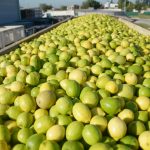Argentine blueberry sector bolsters Medfly eradication plan with SIT

The Argentine blueberry industry has been stepping up its efforts to control and eventually eradicate the Mediterranean fruit fly from the country, this year implementing sterile insect technique (SIT) in a key growing area. 
The Argentinian Blueberry Committee (ABC) said that in 2016 the regional blueberry organizations from Tucuman and Mesopotamia - the two leading production areas - intensified their Medfly monitoring programs.
"We have been working hard in phytosanitary requirements through coordinated actions with regional institutions, provincial governments, and the private sector, aiming to first establish an area of low prevalence and then total eradication," ABC president Federico Baya said.
"The programs complement SENASA's [National Food Health and Quality Service] national Medfly control program, increasing the number of points of study and maintaining the monitoring through 12 months of the year in both areas, with monthly reports on the status of the pest."
He said this year an agreement had been reached in Concordia - a production area in Mesopotamia - with SENASA, the provincial government, and the Blueberry Producers' Association of Mesopotamia Argentina (
The industry also began using SIT this year. SIT is a biological pest control method which introduces sterile flies into the environment that then mate with the wild population, ensuring offspring are not produced.
"As part of the program we carried out training with leading experts in the topic from around the world with all the local technicians, and two releases of sterile male Medflies were carried out," ABC vice president Alejandro Pannunzio said, adding the insects had been produced in Mendoza.
The impact of the STI program is currently being evaluated.
"The project for 2018 is to cover the whole of Concordia with the integrated pest management plan, with combines different control methods, like areal applications in buffer areas and releases of sterile Medflies," Baya said.
In the Northwest of the country, Salta has been working with SENASA and two private companies - Extraberries and Citrus Lules - leading to the inclusion of the southern Metan area into the national Medfly control program in August this year.
The area of northern Buenos Aires is expected to be incorporated in 2018.
Photo: www.shutterstock.com















































